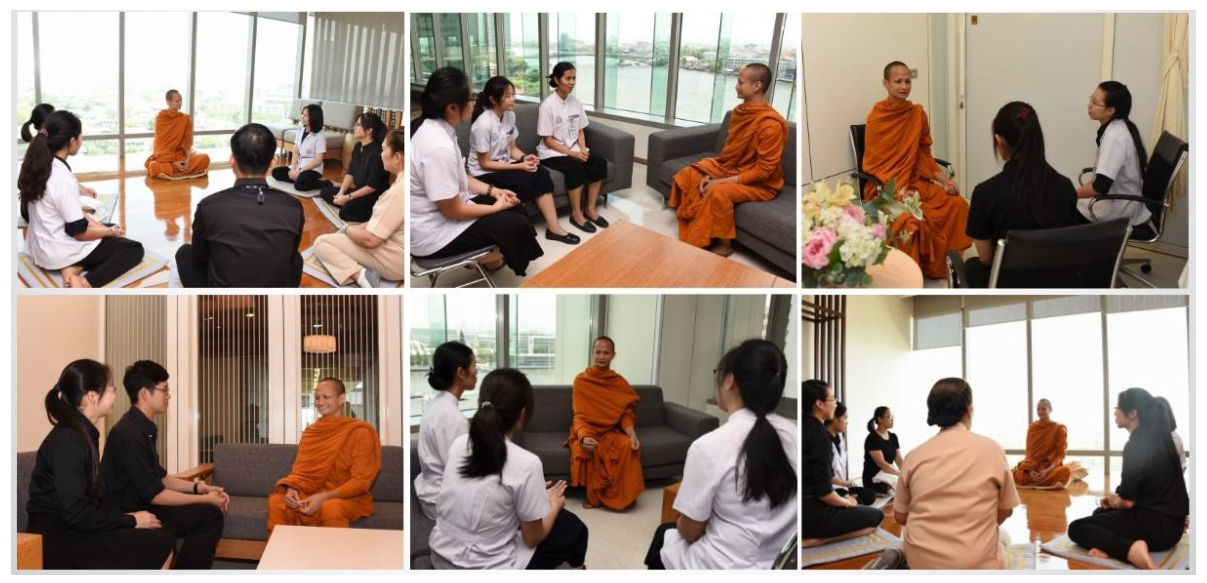“Clinic Rak Jai”: An Integration of Applied Thai Traditional Medicine with Buddhist Counseling for Holistic Care
Main Article Content
Abstract
“Holistic well-being” would refer to the 4 connected dimensions of life: physical well-being, mental well-being, social well-being and spiritual or cognition. The dimensions inevitably dictate and affect one another. One cannot acquire a rewarding life if one, if not more, dimension is not adequately fullfilled. Hence, having an overall healthy well-being often leads to good quality of life. The suffering that occurs, whether it is physical or mental suffering, will affect your thoughts, feelings, attitudes, or even your daily life. Relation between mind and body was mentioned in traditional medicine from the beginning of life (birth), aging, sickness to death as “The mind is the master and the body is the servant”. “Clinic Rak Jai” is intended to provide service to relieve suffering and stress with the integration of Dhammanamaya principles (healthy mind) and Buddhist counseling. This can help alleviate suffering through the mentoring process, providing a comfortable talking or deep con- versation. Both principles based on holistic care are aimed to mitigate physical sufferings which often present in physical pain, uplift unsound mental states, and ultimately improve all dimensions of life.
Article Details

This work is licensed under a Creative Commons Attribution-NonCommercial-NoDerivatives 4.0 International License.
References
Iguti AM, Guimarães M, Barros MBA. Health-related quality of life (SF-36) in back pain: a population-based study, Campinas, São Paulo State, Brazil. Cad Saude Publica. 2021;37(2):e00206019.
National institute of mental health (NIMHN). Mental Illness [cited 2022 May 2]. Available from: https://www.nimh.nih.gov/health/statistics/mental-illness#:~:text=Mental%20illnesses%20are%20common%20in,(52.9%20million%20in%202020).
มูลนิธิฟื้นฟูส่งเสริมการแพทย์ไทยเดิมฯ และโรงเรียนอายุรเวทธำรง สถานการแพทย์แผนไทยประยุกต์ คณะแพทยศาสตร์ศิริราชพยาบาล มหาวิทยาลัยมหิดล. ตำราการแพทย์ไทยเดิม (แพทยศาสตร์สงเคราะห์ ฉบับอนุรักษ์) เล่มที่ 1 ฉบับชำระ พ.ศ. 2550. กรุงเทพฯ: ศุภวนิชการพิมพ์; 2550.
สถาบันการแพทย์แผนไทย กรมพัฒนาการแพทย์แผนไทยและการแพทย์ทางเลือก กระทรวงสาธารณะสุข. ICD-10-TM บัญชีรหัสกลุ่มโรค อาการ และหัตถการด้านการแพทย์แผนไทย. บัญชีจำแนกโรคระหว่างประเทศ ฉบับประเทศไทย.2015.
พระปลัดอานนท์ กนฺตวีโร(ช้างแรงการ) พระมหาสุเทพ สุทฺธิญาโณ. พระสงฆ์กับการเยียวยาจิตใจ. วารสาร มจร มนุษยศาสตร์ปริทรรศน์. 2559;1:46.
โรงเรียนอายุรเวทธำรง สถานการแพทย์แผนไทยประยุกต์ คณะแพทยศาสตร์ศิริราชพยาบาล มหาวิทยาลัยมหิดล. การแพทย์แผนไทย ในคณะแพทยศาสตร์ศิริราขพยาบาล. 2, editor. กรุงเทพฯ: ห้างหุ้นส่วนสามัญ พี.เอส.เพรส; 2552.
พระพรหมคุณาภรณ์ (ป.อ. ปยุตฺโต) พระธรรมปิฎก (ประยุทธ์ ปยุตฺโต). พจนานุกรมพุทธศาสตร์ ฉบับประมวลธรรม [cited 3 มีนาคม 2565]. Available from: https://84000.org/tipitaka/dic/d_item.php?i=204.
พระครูภาวนาวีรานุสิฐ วิ. กระบวนการให้คำปรึกษาเชิงพุทธจิตวิทยา,. วารสารบัณฑิตศึกษาปริทรรศน์. 2560;3:144.
พระอนันตชัย อภินนฺโท (ขันโพธิ์น้อย). ความทุกข์ในอริยสัจ 4. Buddhist Psychology Journal. 2560;2.
โสรีช์ โพธิแก้ว. การสังเคราะห์หลักอริยสัจ 4 สู่กระบวนการปรึกษาเชิงจิตวิทยา/ จิตรักษาเพื่อพัฒนา รักษา และเยียวยาชีวิตจิตใจ: แนวคิด แนวทาง ประสบการณ์ และงานวิจัย. กรุงเทพฯ: หลักสูตรสาขาวิชาจิตวิทยาการปรึกษา คณะจิตวิทยา จุฬาลงกรณ์มหาวิทยาลัย; 2553.
ตะวัน วาทกิจ. ความทุกข์ทางใจในบริบทพุทธธรรม. วารสารราชภัฏเชียงใหม่. 2557;1:109.






